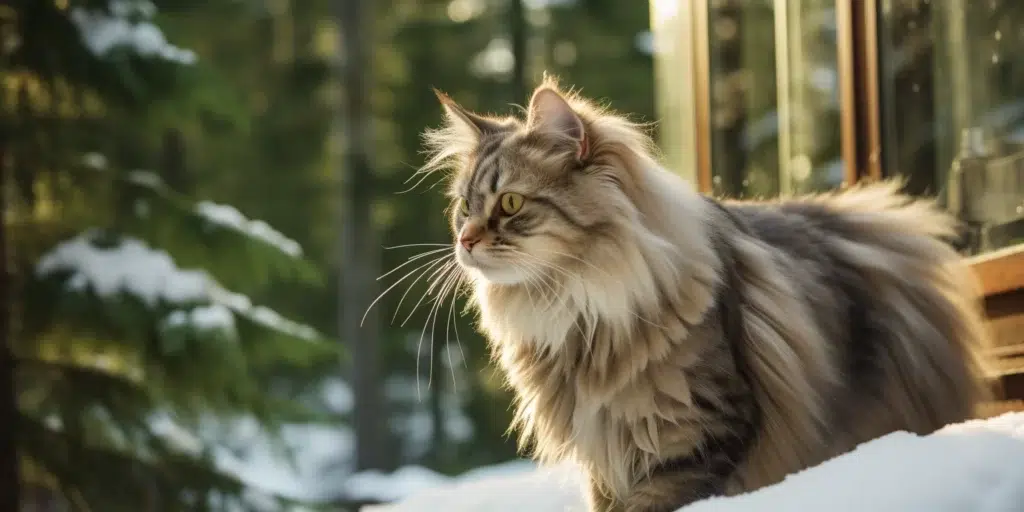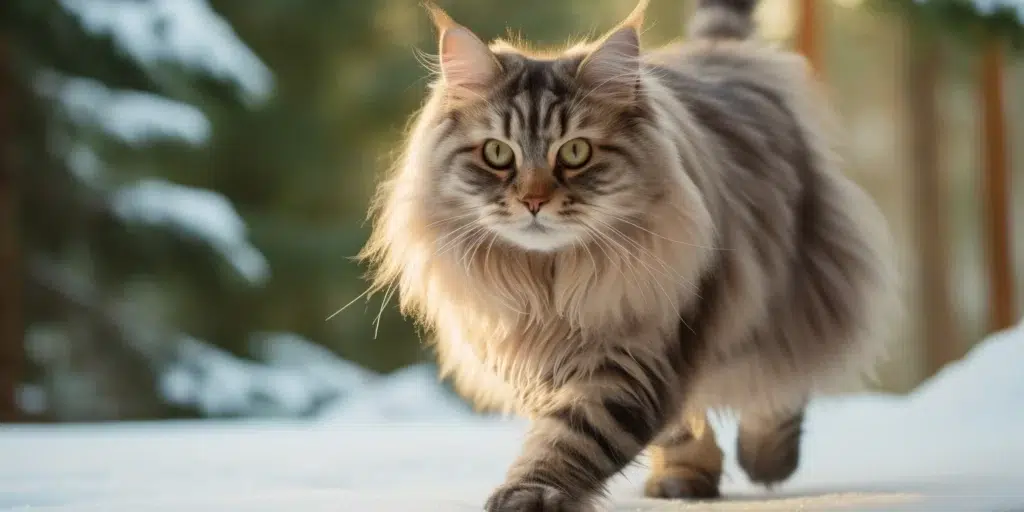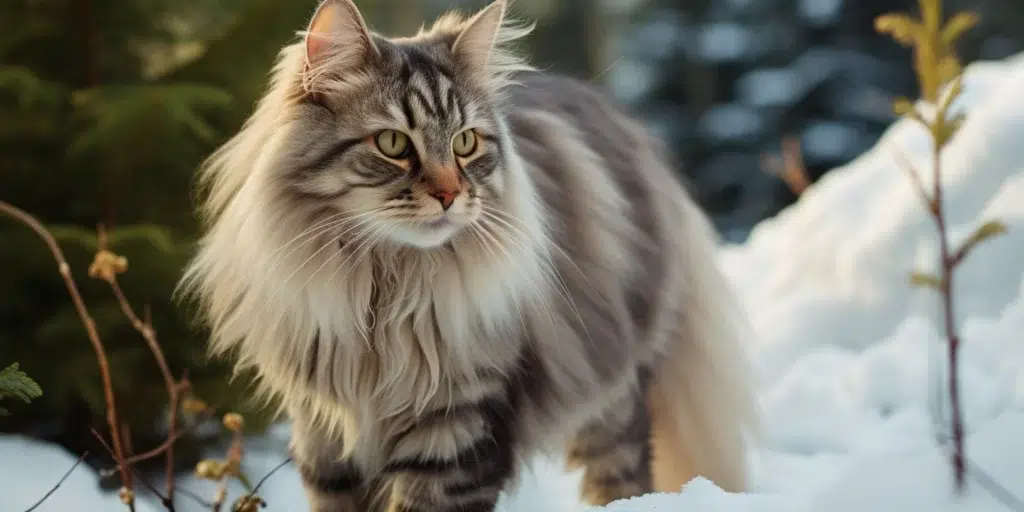Have you ever wondered about the variety of sounds your Siberian cat makes? If you have a Siberian cat at home, you might already know they have their own unique way of “talking” to us.
From soft purrs to loud meows, understanding Siberian cat vocal noises can be an interesting adventure! In this blog, we’re going to dive deep into the world of Siberian cat sounds, why they make them, and what they could mean.
Siberian cats are known for their majestic fur and playful personalities, but did you ever pay attention to how vocal they can be? Like humans, these furballs use their voices to express a wide range of emotions and needs.
Whether they are trying to tell you they’re hungry or just want some cuddles, each sound has its significance. So, buckle up, and let’s explore the fascinating world of Siberian cat vocal noises!

Are Siberian Cats Vocal Cats?
Yes, Siberian cats can indeed be vocal. However, like people, each cat has its unique personality and way of expressing itself. Some Siberian cats might chat your ear off, while others might be more on the quiet side.
The gender of the Siberian cat can sometimes play a role in how vocal they are. Male cats, especially those not neutered, often have a propensity to be more vocal, marking their territory or seeking a mate.
However, this isn’t a hard and fast rule, as individual personality can outweigh gender tendencies. It’s also crucial to note that a cat’s life stage can influence its vocalizations. Young kittens, for example, might meow more as they are learning to communicate with their humans and environment.
Moreover, a Siberian cat’s activity level can affect its vocalization. Active cats might be too busy exploring and playing to stop and chat, while more laid-back kitties might use their voices more to attract your attention.
It’s fascinating to see how a cat’s noise level can change based on what they’re doing or what they want!
Factors That Influence Siberian Cat Noise Levels
Their Age
Kittens are often more vocal than adult cats. This is because meowing is a kitten’s way of communicating with their mother — asking for warmth, attention, or food.
As they grow older, Siberian cats usually become less reliant on vocalizations since they learn other ways to communicate their needs or contentment, relying more on body language or more subtle sounds.
During adolescence, a Siberian cat’s vocalization might increase as they test their boundaries and communicate with other cats or their human family. They’re discovering their “voice,” much like teenagers do! As they transition into adulthood, their noise level may taper off, settling into a more consistent pattern of vocalization that reflects their personality and needs.
Lastly, senior Siberian cats might become more vocal again, possibly due to health conditions or confusion. Changes in their environment or routine might stress them, prompting them to vocalize their discomfort or confusion more frequently.
It’s essential to pay attention to these changes and consult a vet if there’s a sudden increase in vocalization, as it could indicate an underlying issue.
Feeding Siberian Cats and Its Relation to Noise Levels
Hunger can be a significant factor in a Siberian cat’s vocalizations. Who hasn’t been woken up by a demanding meow for breakfast? Cats quickly learn that making noise can lead to them getting what they want — food!
This is a learned behavior; cats don’t meow at each other in the wild for food, but domestic cats have honed this skill to communicate with their humans.
If you notice your Siberian cat becomes particularly vocal around meal times, it’s because they’ve associated certain sounds with the reward of getting fed.
To manage this, sticking to a regular feeding schedule can help minimize excessive meowing around meal times. It teaches them when to expect food and reduces anxiety or impatience.
Interestingly, the type of food might also influence their vocalizations. Cats fed with a more stimulating and interactive feeding method, like food puzzles, might be less vocal since their minds are engaged and they’re exerting energy to get their food, mirroring more natural feeding behaviors.

Siberian Cat Exercise Level affects Their Noise Levels
Exercise and playtime are crucial for all cats, including Siberians. A well-exercised cat is usually a quieter cat.
That’s because they’re using their energy for physical activities, leaving them more relaxed and content. A Siberian cat with plenty of toys and space to explore may meow less since they’re satisfied and entertained.
On the other hand, a Siberian cat that doesn’t get enough exercise might become more vocal in seeking attention or out of boredom. Keeping your Siberian cat active not only helps them stay healthy but also helps manage their vocalizations.
Interactive toys, climbing trees, or simple things like cardboard boxes can stimulate their natural hunting instincts and keep them entertained.
Furthermore, a consistent play routine can strengthen the bond between you and your Siberian cat, providing them with reassurance and reducing stress-related vocalizations. Playing together is a silent form of communication that speaks volumes to your cat about your love and care for them.
Medical conditions
Sometimes, increased vocalization in Siberian cats could signal health issues. As cats age, they might face conditions like thyroid problems or hearing loss, which can cause them to vocalize more either due to discomfort or confusion.
Regular veterinary check-ups are crucial to detect any medical problems early on. If your Siberian cat starts meowing more frequently or more loudly than usual without apparent reason, it might be a good idea to consult your vet.
Paying attention to other signs, such as changes in eating habits, activity levels, or grooming, in conjunction with increased vocalizations, can provide important clues about your cat’s health. It’s always better to be safe and get your furry friend checked out if anything seems out of the ordinary.

Siberian Cat Noises and Their Meaning
Understanding the noises Siberian cats make can significantly enhance the bond between you and your feline friend. Each sound carries its message, whether it’s a request for food, a desire for cuddles, or an expression of discomfort.
Meow (The Most Common Noise)
The “meow” is perhaps the most recognized cat noise, and Siberian cats are no exception. Kittens meow to communicate with their mothers, but adult cats usually reserve this sound for their human companions. A meow can mean anything from “hello” to “feed me” to “pay attention to me.” The tone, volume, and context can help you discern the message behind your cat’s meow.
Purring (The Most Enjoyable Cat Noise)
Purring is often associated with a cat’s contentment, and there’s hardly a sound more comforting than a Siberian cat’s purr. However, cats also purr when they’re in pain, anxious, or even during birth, so it’s not exclusively a sign of happiness. The circumstances under which your cat purrs can give you a clue about its emotional state.
Hissing (Your Cat Feels In Danger)
A hiss is a clear indication that your Siberian cat feels threatened or is in a defensive stance. It’s a warning noise, telling you or another animal to back off. It’s crucial to respect your cat’s space when they hiss and try to identify and remove the cause of their distress.

Yowl (Not a Happy Meow)
A yowl is a longer, drawn-out sound that can indicate distress, discomfort, or the desire to mate. It’s a more intense communication, signaling that your cat needs attention or there’s something wrong.
Growls (Not as Scary as a Tiger)
Siberian cats might growl when they’re annoyed, scared, or territorial. It’s a clear sign to give them some space and ensure they feel safe and secure.
Some Cats are More Talkative Than Others
Just like people, some Siberian cats are naturally more communicative than others. It can depend on their personality, their upbringing, and even their breed traits.
Observing your cat’s vocal habits can give you insights into their personality and how they prefer to interact with the world around them.
How to make Siberian Cats less vocal?
If you’re looking to reduce your Siberian cat’s vocalizations, consider their needs: Are they bored, hungry, or lacking attention?
Meeting these needs can help quieten them down. Regular playtime, consistent feeding schedules, and quiet, calm interactions can reassure them and reduce the need for vocal communications.

Conclusion
Understanding the variety of noises your Siberian cat makes can deepen the bond you share. Each meow, purr, hiss, yowl, or growl has its meaning, and learning this language allows you to cater to your cat’s needs better and ensure a happy, healthy, and harmonious coexistence.
Whether your Siberian is a chatterbox or the strong, silent type, they have their own unique way of expressing love, needs, and even displeasure. So, listen closely, and you might just discover the paw-some world of Siberian cat vocal noises!